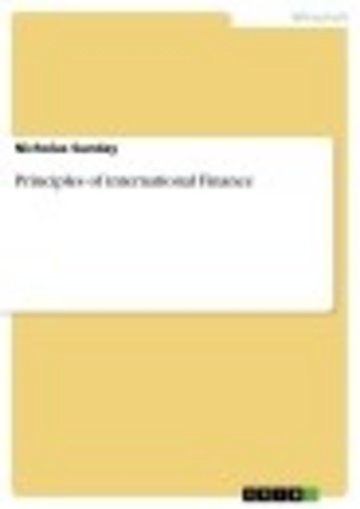Principles of international Finance

| Autor | Nicholas Sunday |
|---|---|
| Verlag | GRIN Verlag |
| Erscheinungsjahr | 2013 |
| Seitenanzahl | 119 Seiten |
| ISBN | 9783656368519 |
| Format | PDF/ePUB |
| Kopierschutz | kein Kopierschutz/DRM |
| Geräte | PC/MAC/eReader/Tablet |
| Preis | 34,99 EUR |

| Autor | Nicholas Sunday |
|---|---|
| Verlag | GRIN Verlag |
| Erscheinungsjahr | 2013 |
| Seitenanzahl | 119 Seiten |
| ISBN | 9783656368519 |
| Format | PDF/ePUB |
| Kopierschutz | kein Kopierschutz/DRM |
| Geräte | PC/MAC/eReader/Tablet |
| Preis | 34,99 EUR |

Seit der Entstehung des Neuen Marktes haben Gründungsmanagement und Gründungsfinanzierung eine gänzlich neue Dynamik erfahren. In diesem Buch werden alle Facetten der Grü…

Seit der Entstehung des Neuen Marktes haben Gründungsmanagement und Gründungsfinanzierung eine gänzlich neue Dynamik erfahren. In diesem Buch werden alle Facetten der Grü…

Das Thema "Altersvorsorge" wird bei Investmentgesellschaften und Versicherungen weiterhin für dynamisches Wachstum sorgen. Der erweiterte gesetzliche Rahmen für die Anlagetätigkeit von…

Das Thema "Altersvorsorge" wird bei Investmentgesellschaften und Versicherungen weiterhin für dynamisches Wachstum sorgen. Der erweiterte gesetzliche Rahmen für die Anlagetätigkeit von…

Das Thema "Altersvorsorge" wird bei Investmentgesellschaften und Versicherungen weiterhin für dynamisches Wachstum sorgen. Der erweiterte gesetzliche Rahmen für die Anlagetätigkeit von…

Eine gute Bonitätsnote wird zum Dreh- und Angelpunkt der Konditionen. Nur wer die Regeln kennt, nach denen Ratings erteilt werden, kann sich die Prüfverfahren vorbereiten. Autor Dr.…

Im Zuge der Bemühungen um einen einheitlichen europäischen Zahlungsverkehrsraum, die sogenannte Single Euro Payment Area, gewinnt der bargeldlose Zahlungsverkehr auch im Retailbereich zunehmend an…

Im Zuge der Bemühungen um einen einheitlichen europäischen Zahlungsverkehrsraum, die sogenannte Single Euro Payment Area, gewinnt der bargeldlose Zahlungsverkehr auch im Retailbereich zunehmend an…

Im Zuge der Bemühungen um einen einheitlichen europäischen Zahlungsverkehrsraum, die sogenannte Single Euro Payment Area, gewinnt der bargeldlose Zahlungsverkehr auch im Retailbereich zunehmend an…

Im Zuge der Bemühungen um einen einheitlichen europäischen Zahlungsverkehrsraum, die sogenannte Single Euro Payment Area, gewinnt der bargeldlose Zahlungsverkehr auch im Retailbereich zunehmend an…

Auszüge aller europäischen Patentanmeldungen in sechs Teilausgaben. Bibliographie, Hauptanspruch, wichtigste Zeichnung. Dokumentation des Hauptanspruchs in der Amtssprache der jeweiligen Anmeldung. ...

Vom Deutschen Patent- und Markenamt erteilte Patente. Bibliographie, Patentanspruch, wichtigste Zeichnung. Thomson Reuters is the world’s leading source of intelligent information for businesses ...

»Berufsstart Gehalt« erscheint jährlich zum Sommersemester im Mai mit einer Auflage von 50.000 Exemplaren und ermöglicht Unternehmen sich bei Studenten und Absolventen mit einer ...

Die COMPUTERWOCHE berichtet schnell und detailliert über alle Belange der Informations- und Kommunikationstechnik in Unternehmen – über Trends, neue Technologien, Produkte und Märkte. IT-Manager ...

Gefahrgutvorschriften sind kompliziert, sie in die Praxis umzusetzen ist es auch. der gefahrgutbeauftragte macht die Arbeit leichter: Gefahrgutbeauftragten, beauftragten Personen und ...

Die DTZ – Deutsche Tennis Zeitung bietet Informationen aus allen Bereichen der deutschen Tennisszene –sie präsentiert sportliche Highlights, analysiert Entwicklungen und erläutert ...

Prüfungs- und Praxiswissen für Zahnmedizinische Fachangestellte Mehr Erfolg in der Ausbildung, sicher in alle Prüfungen gehen, im Beruf jeden Tag überzeugen: „Die Zahnmedizinische ...

Bau und Einsatz von Werkzeugmaschinen für spangebende und spanlose sowie abtragende und umformende Fertigungsverfahren. dima - die maschine - bietet als Fachzeitschrift die Kommunikationsplattform ...

rfe-Elektrohändler ist die Fachzeitschrift für die CE- und Hausgeräte-Branche. Wichtige Themen sind: Aktuelle Entwicklungen in beiden Branchen, Waren- und Verkaufskunde, Reportagen über ...

Das unabhängige Magazin für Anwender und Entwickler, die mit dem Datenbankprogramm Claris FileMaker Pro arbeiten. In jeder Ausgabe finden Sie von kompletten Lösungsschritten bis zu ...